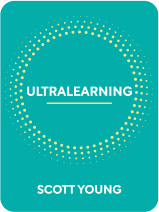

This article is an excerpt from the Shortform book guide to "Ultralearning" by Scott Young. Shortform has the world's best summaries and analyses of books you should be reading.
Like this article? Sign up for a free trial here .
Do you want to deepen your level of understanding of a subject enough to develop intuition? What are the four rules for developing deeper knowledge?
Fixating on surface-level aspects of a subject or skill won’t allow you to have a complete understanding of it. But if you follow these four rules then you will be able to delve so deep into a subject that the knowledge turns into intuition.
Continue on to learn how to develop intuition.
Practice Is the Key to Developing Intuition
Beginners often fixate on surface-level aspects of a problem or learning goal. In contrast, experts delve into deeper layers and principles. This approach is more successful because it leads to a more complete understanding of the problem and its solution and it’s how to develop intuition.
Deeper understanding improves intuition. We often think of intuition as mysterious and unexplainable, but actually, intuition is the result of deep, detailed understanding. When you have a lot of experience and knowledge related to a problem, you are better equipped to think of novel ways to solve it.
It’s not enough to overlearn something—that won’t deepen your understanding. There are four critical rules to developing intuition and deeper knowledge.
Rule #1: Let Yourself Struggle
Force yourself to struggle when you encounter a difficult problem or obstacle to your learning goal. Encourage this by setting a timer for 10-15 minutes and pushing yourself to work on the problem at least until the timer goes off. Either you will solve the problem during that time, or you better support yourself to solve the problem later because as stated in Chapter 6, you boost retrieval when you allow yourself to struggle to come up with answers you don’t have.
Rule #2: Aim to Prove
We often think we understand things when in reality we have only a partial or rudimentary understanding. Researchers have deemed this phenomenon the “illusion of explanatory depth.” For example, you might think you understand what a bicycle is and how it works, but if you were asked to draw a detailed picture of the mechanisms, you might find that you don’t understand as much as you thought. We think we understand better than we do because we evaluate our understanding using indirect signals.
Always ask yourself, “Do I understand this well enough to explain how it works?” Experts don’t consider something to be understood unless it is understood deeply, and they usually define that differently than those who are less proficient. Whereas a beginner might replicate the processes of others and become proficient, experts master things because rather than copy the processes and results of others, they work through their own process of achieving the result. This can cause detours and delays, but the result is that you learn more deeply. If you start with the answer to a problem and figure out your own way of arriving at that answer, you will have a deeper understanding than if you simply followed the traditional route to reaching the answer. For example, you will learn math more deeply by starting with the solution of an equation and working backwards to understand it than you will memorizing the equation that creates the result.
Rule #3: Challenge Your Understanding
When you don’t know enough about a skill or topic, something known as the Dunning-Kruger effect can make you believe you still know more than those with proven understanding. The more you know, generally, the more you question what you know. If you don’t challenge what you do know, you will consequently know less.
If you don’t ask questions out of a desire to “feel good” about your knowledge level, you rob yourself of deeper learning, and your overall knowledge suffers because you convince yourself you do know enough. Make sure your learning standards are strict and frequently question yourself. There is no such thing as a dumb question because the act of questioning supports you to gain knowledge you might have missed otherwise.
Rule #4: Prioritize Concrete Examples
It’s difficult for the human brain to comprehend abstract concepts. We need to connect the abstract information to concrete associations. This works best if you create your own concrete examples, because the way you think about what you’re learning directly impacts retention. If you process information by making deeper, more personal associations to it, you retain it at a deeper level. If you’re not able to come up with a concrete example, you likely don’t understand deeply enough.
For example, in a recent recall study, participants were shown a list of words. Half of the group was told they’d be tested on the words, and the other half was just told to study them. The groups were then split in half again, and one half was instructed to notice the words with the letter “e” in them (shallow processing), while the other was instructed to notice how the words made them feel (deep processing). It turned out that the testing motivation made no difference, but those instructed to notice how the words made them feel retained twice as many words. This “concrete association” method supports retention, develops intuition (deep understanding), and provides feedback because you need to understand what you’re learning deeply in order to create a concrete example.
Alternatively, say you’re studying the periodic table of elements (abstract information), and using flashcards to do so. Connect the abstract information to something concrete by imagining something you’d do with each element. For example, if you’re learning about copper, imagine making a penny out of copper.

———End of Preview———
Like what you just read? Read the rest of the world's best book summary and analysis of Scott Young's "Ultralearning" at Shortform .
Here's what you'll find in our full Ultralearning summary :
- How a formal education doesn’t open the doors it once could
- The 9 core principles that can help you master any skill
- How to create a self-directed learning project to help you advance in your field






